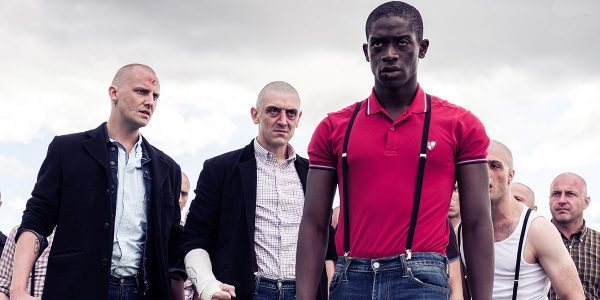Two films at TIFF this year – both inspired by true events – seemed preternaturally linked in their representations of race and racism in Europe. The French/German period piece “Angelo” and the lurid British pop-film “Farming” exist on starkly different ends of filmmaking but come together to ask a similar question – what does it mean to be black in a world that sees your skin as a curiosity? The answer to the question might be obvious, but both “Angelo” and “Farming” offer provocative, if overwhelming, depictions of two different Europes linked by their subjugation of the black man.
A Countess in 18th century Vienna observes a row of young black boys. They have been washed and clothed and decked out for her viewing. She clasps her gloved hands nervously, peering through her veil. Her gaze finally settles on one in particular. This one. That’s the beginning of the story. Except, it isn’t really. That boy will soon die, whittled down by the exhausting trip from Africa and so the Countess must return to pick (Buy? Choose? Procure?) another boy. This one will live. This one will become the Angelo of her tale. The story sounds almost bizarre enough to be amusing. This is no farce or burlesque, but director Markus Schleinzer’s adaptation of a true story. The story of Angelo Soliman, a freemason of whom little is known and little remains. And so, from the inception, Schleinzer’s “Angelo” disconcerts us for its oddness. The title of the film is more sardonic confrontation than earnest representation for although everything in the film concerns “Angelo”, this Viennese “court moor”, the film is really a mirror of the ice-cold remoteness of 17th century Vienna.

Schleinzer’s Angelo is a formalist’s wet-dream, low on emotion and instead high on structures. The production design is overwhelming in its sumptuousness and the swooning camera is disorienting and distancing. Everything on the surface of “Angelo” looks compelling but it’s a structuralist dream that gives way to a nightmare. Things are awry from the inception, with the classic 4:3 aspect ratio teasing something just slightly off in ways that we cannot quite explicate at first. Early on when Angelo is told, “Don’t be afraid. Evil lies behind you. You will set an example,” we know this new world is not one of goodness.
Adewale Akinnuoye-Agbaje’s “Farming” takes place two centuries later in 1960s London. The title refers to the euphemism for the social experiment of the time where African children were farmed out to white working-class families in the UK to grant them citizenship. The time and the country differ, but the misconceived notion of white Europe as a saving grace for African children remains. If “Angelo” is an ornate representation of coldness, “Farming,” is a frenetic, outburst of red-hot anger. Enitan, the protagonist of “Farming” is taken in by white couple with almost a dozen black children. The situation is less impressive than his biological parents seem to think, and things come to a head when he becomes part of a racist skinhead gang, targeting people who look like him.
Both, Angelo and Enitan are black men who are nominally free in societies which loathe their skin colour. The important case that both “Farming” and “Angelo” makes is that to be excused as “special” in a world where your race is a liability is no specialness at all. And, so, Schleinzer (he cowrites the film with Alexander Brom) complicates the specialness the Countess and the court claim in Angelo by emphasising his silence. Angelo’s silence in his story is not a formal liability but a shrewd literalising of the limits of blackness in a racist society. That Angelo feels like a mere afterthought in his own story is an exclusion that smarts but it’s credit to Schleinzer that in representing Angelo he does not placate us by filling in gaps but instead forces us to contemplate the life he lived, forever on show, all the way down to the film’s exhausting final sequence, where the dead Angelo is robbed a burial and made into a figure in a cabinet of curiosities.

“Farming,” for all its brutality, gives us a chance to breathe in an end-credits fact-finding mission that informs us of the way the real Enitan’s life improved after the period depicted in the film. It’s a solitary moment of release in a film that elicits shudders from the inception. “Farming” begins in media res with a scene of a black man being battered. The shadowy light hides his assailant. “Please, brother,” he moans. It’s a line that seems incongruous until we see Enitan’s sinister face. This is another black man but this is no brother. “Angelo” spares us of any overt existence of violence, but that makes it no more comforting. In its closest thing to physical excess occurs in a scene where the young boy is threatened with corporal punishment. It’s an especially literary moment as it gives way to his first line of the film, a resounding “NO!”
Both films feature scenes where the white masses look on at the lone black figures in something akin to wonder. Angelo plays a recorder beautifully. “It’s your first grand victory on the path to becoming human,” he’s told. For, Enitan it’s his violent openness as he pummels an enemy of his skinhead family. The idea of the “special” black man, whose talents impress the white population around him as a bridge to improved race-relations is a familiar, if exhausting trope. “Angelo” and “Farming” see no hope in this admiration, though, only the darker reality of this depraved world. In an ideal world, Akinnuoye-Agbaje might lend some of his fire to give Schleinzer’s “Angelo” some warmth, and Schleinzer would give “Farming” some structure. But both films seem to deliberately move beyond formalist critiques, embodying the personalities of their respective protagonists and societies, becoming either icily repressed as Viennese society demands in “Angelo” or chaotically, frenetic like the poor London of “Farming.”
Both films offer moving shots of Enitan and Angelo gazing out at the world around them. Enitan is a fuse, about to blow. Angelo is a remote cipher, impossible to read. We can only imagine what either is thinking in a society where their very thoughts are policed. One might imagine James Berry’s lines from his poem, intoning, “I wish life wouldn’t spend me out opposing.” The two films come to the similar fact in different ways, but their similar thesis is no less affecting for it. One’s identity becomes difficult to sustain in a society working to whittle you down.
“I’m a son of Africa, but a man of Europe,” Angelo says midway through his film. But the truth might be somewhere removed for both he and Enitan. Both men cross an ocean to meet a world that does not want them as they are, and are thus thrust into lives of displacement. These two historical tales feel all too relevant in 2018.







